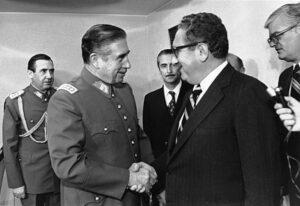VIDEO: Robert Scheer: Foreign Entanglements Derailed the American Experiment (Part 8 of 10)
In the eighth installment of an interview series on The Real News Network’s “Reality Asserts Itself,” Truthdig Editor-in-Chief Robert Scheer tells TRNN Senior Editor Paul Jay that American leaders “lost sight of the essential wisdom of the American experiment,” which was that if you enable prosperity “for your own people, and if it’s good, others will follow it.”In the eighth installment of an interview series on The Real News Network’s “Reality Asserts Itself,” Truthdig Editor-in-Chief Robert Scheer tells TRNN Senior Editor Paul Jay that over time, American leaders have “lost sight of the essential wisdom of the American experiment,” which was that if you enable prosperity “for your own people, and if it’s good, others will follow it.”
How did the U.S. get into this predicament? “Because of the very thing that George Washington warned about, the impostures of pretended patriotism,” Scheer says. “We get into it because we haven’t avoided foreign entanglements. So we see we get crazed with hysteria–oh, they did that to us. They’re the enemy. They’re going to get us. They’re going to blow us up. They’re going to–you know, irrationality. Nationalism has an irrational side. Warmaking appeals to people. There’s a culture that supports warmaking and stupidity and simplicity.”
The interview is part of a 10-part series conducted after the publication of Scheer’s book, “They Know Everything About You: How Data-Collecting Corporations and Snooping Government Agencies Are Destroying Democracy.” Watch Parts One, Two, Three, Four, Five, Six and Seven.
A transcript of the discussion provided by The Real News Network appears below.
— Posted by Alexander Reed Kelly.
PAUL JAY, SENIOR EDITOR, TRNN: Welcome back to Reality Asserts Itself on The Real News Network. I’m Paul Jay. And we’re continuing our series of interviews with Bob Scheer, who joins us in the studio.
Thanks for joining us again.
So, one more time, Bob is the editor-in-chief of Truthdig, multi Webby Award winning website. He’s also the author of They Know Everything About You: How Data-Collecting Corporations and Snooping Government Agencies Are Destroying Democracy.
So we ended the last segment talking about how do we get to this saner, more rational kind of society. And maybe you can even contextualize it a bit in terms of what’s happening with the destruction of democracy, both through snooping and what’s happening to the electoral system.
PROF. ROBERT SCHEER, JOURNALIST AND AUTHOR: But why are they snooping? They’re snooping because they say we have enemies everywhere. And why do we have enemies everywhere? Because we put ourselves up as this nation that can determine everything for everyone. Okay? And we lost sight of the essential wisdom of the American experiment, you know, which was our framers, which is do it here, do it for your own people, and if it’s good, others will follow it. If we have a way of respecting each other, of solving our problems, if we can develop cohesion, right, it’s what everyone who ever came and intelligently observed our society, de Tocqueville most famously, and said, they care about each other or they know how to work with each other.
That’s the model, not that we could have–interfere in Iraq and decide who should be their leader or we can tell you who should run Afghanistan or how to deal with the Sunni-Shia issue between Saudi Arabia–. We don’t know anything about that. We’re not particularly good students of the world. We don’t know foreign languages. We don’t travel very extensively. We’re the last group of people that should really be sorting it out for the rest of the world.
JAY: But ever since the Philippines, it’s been nonstop.
SCHEER: I understand. I’m just saying that the reason people come here, okay, is that they like some aspects of our quality of life, our weather, our way of being, our way of producing. You know.
And let me just say, I am a great admirer of this country. You know, I’m a product of two immigrants and families of immigrants that came here because this is a great place. And I think–I know my parents went to their death thinking they made a right choice. Okay? And so I am a big believer in the American experiment, not as something that has succeeded in every respect or has the answer for everyone else, but there are some very good qualities.
So let’s take those qualities. We used to have at the heart of it the notion that everyone had to have an equal opportunity. Now, let me qualify the everyone. Yes, we were flawed from the beginning. We had slavery. And after slavery, we had segregation. And yes, women were denied their full–. We know that. But let’s just take the key idea, which is that the significant group of the population, okay, the citizens that were supposed to have found [incompr.] they had to have equal opportunity, that they had to be able to succeed, that there had to be cohesion. Okay? We would raise the barn together. You know. And we had schools that would work very early on, including universities, that would be publicly funded, okay, and that we would have waterways and highways that would work, and there was a collective responsibility.
I read something in Truthdig today that–Chris Hedges had an interview with people who were talking about–a young hip-hop artist [incompr.] talking about the failure of the American experiment, and they raised an interesting question. It takes you very local local, since you like local. What we charge for parking tickets, what we charge for crime, local crime, low-level, it turns out that in all of these cities now in America, we’re paying for this whole bureaucracy, many of whom don’t even live in the city, didn’t really experience the economic downturn [incompr.] because they had steady jobs, by traffic tickets or by low-level crime fines and so forth. Thirty, 50 percent of the budget of these cities that pays for the police, the fire department, everything else is coming from people in a regressive tax. People who can least afford it are paying this. Okay?
At the same time, in every one of these American cities now you have this massive homelessness, disenfranchised people, people who have to beg for a living. I just tried walking from downtown Baltimore, the train station, to your studio. I was hit up, I don’t know, 15 times by people wanting money.
JAY: Homeless people.
SCHEER: I don’t know whether they’re homeless or not. They certainly are–what they’re doing is begging, and at the train station, two blocks away, four blocks away, here and there. Well, I live in downtown Los Angeles. You can’t go anywhere without being hit up all the time. And these people are not faking it. They’re cut off. They’re cut loose. Okay.
You now have a situation where in every American city the people who are going to be the most successful have mostly turned their back on the public schools, the most sacred American institution. You know, if you go back to Jefferson or anyone, it was a notion of public access to ideas, to books, to education.
We have lost that idea. We have a tiered system. And you go to the good school, you’ll get ahead. You go to this school, you won’t get ahead. You know? I have a son who’s been teaching in the largest school in Oakland, California, for the last eight years, you know, and he can tell you, here’s a school expected to solve all the problems the rest of society has ignored, you know, the effects of segregation, broken homes, the going away from industrialization to jobs that don’t pay, etc., and you don’t even have the resources in the school to do that. You know, breakup of the family, everything else.
So if we got back to a notion of what excited de Tocqueville in writing about America or any of the other visitors, it was a social network, social network, and that opportunity was built into the network, a certain classlessness, the idea that anyone could sort of get ahead, survive, succeed. And we’ve lost that. And we’ve lost that because our resources have been taken off to foreign adventure. Our focus, our preoccupation has been what is going on with the surge in Iraq or what is going on, you know, stuff that we have very little ability to control, don’t know what to do. And we’ve taken attention from what should we do here, between here and the train station. What are we doing with our local communities? What are we doing with our schools? Our whole focus.
JAY: Lost it when?SCHEER: We lost it because of the Cold War. We lost it because of hysteria. But increasingly it got–what’s the right word? It got distorted in absolutely bizarre ways, where now we say we have–at least we used to think there’s an enemy we can somehow deal with, like the Soviet Union [incompr.] we could negotiate, we can have understandings. We now have an undifferentiated enemy called terrorism, right, that will, like the rain, like snow, always be with us, right? I mean, there’s always going to be some people that are angry. Now, you can do something. We can get people angry with us by dropping drones and killing their family members. You could be rational about it. But there’s always going to be nonstate actors that are angry with somebody about something and are going to do terrible things–seize a bus, blow up something, and so forth. Okay?
Instead of having a rational discussion about how can we minimize our involvement with all that, which is real, because we are sticking our stick in the eye of all of these things–religious fanaticism, nationalism, what have you. You know, we’re somehow off on this crazy crusade to get as many people angry with us as we possibly can. It’s the only rhythm or logic to our foreign policy. How can we–you know, just think of the whole drone campaign, calculated to get huge, extended families ticked off with you, I mean, furious, ’cause you killed their cousin or their nephew or somebody, and they’re going to remember that for 50 years. It’s going to be passed on, family members. That’s what we did.
You take the–how did this all start, the war on terror? Afghanistan. Okay? You take that. Now, I mean, maybe people watching this don’t want to know, but think about it. What are the basic thing to know about the war in Afghanistan? That Afghanistan was not our problem. Now, nobody I ever knew walked around and said, hey, life would be really better if we could bring democracy to Afghanistan.
JAY: But it was about trying to bring down the Soviet Union.
SCHEER: No. What it was about was some people playing a game of politics. Zbigniew Brzezinski–and I knew him. My kids went hiking with him and my son went hiking with him. I had dinner with him at his house. His wife [crosstalk]
JAY: I interviewed him. He still brags about it, sucking the Soviet Union into Afghanistan.
SCHEER: Yeah. Oh, no. He told in an interview with [incompr.] He says, well, so what? We get some riled up Muslims. What is that compared to our humbling the old Soviet Union? ‘Cause he was a Polish refugee, and his whole preoccupation was with the Soviet Union, which, okay. But then he drags the United States–and he wasn’t alone; there were plenty of hawks who followed him, Republican and Democrat.
JAY: Jimmy Carter.
SCHEER: Well, he started with Jimmy Carter, but, you know, then it was Ronald Reagan after that, and absolute madness that somehow the life experience of Americans will be enhanced by this focus on Afghanistan. Instead it was just the opposite. It got destroyed by this focus, because suddenly we had, first under him, when he was national security adviser to Carter, but then under the Reagan folks, we went, our CIA, recruiting every lunatic they could find in the world to be called a so-called freedom fighter, give him Stinger rockets, and go fight the Soviets in Afghanistan. It was an exercise in absolute madness that still haunts us. Okay?
Instead of learning that lesson and saying, wait a minute, maybe it is not for us to figure out how people should live in Afghanistan, whether they should grow opium or whether they should follow this guy are this warlord or have the border here or something, let them work it out, let them work it out with Pakistan, let them work it out with India, let them figure it out, maybe this is not something we really know about, no. We said, let’s make that exercise in stupidity a model for what we do everywhere. Let’s figure out how the Iraqis should live and how the Iranians should live, you know, and the Syrians should live. Let’s go everywhere, muck about. Then let’s decide, oh, that guy down in Venezuela, he’s no good, you know, that Chávez guy. Get rid of him and so forth. This is nuttiness everywhere that you’re going to meddle.
And at the same time, you can’t solve the problem of the people living in cardboard condos in downtown Los Angeles who can’t function. Alright? And what do they need? Medical or something. They need a job, they need training, they need clothes, they need a shower. You can’t solve this problem right in the heart of your city, your major cities, right, you can’t make your public school work, you can’t give people opportunity, you can’t deal with your enduring racial tensions and racism, you know, you can’t make progress in any of these areas. So you do, like a lunatic, you say, I’m not going to deal with that; I’ll go solve the problem of Iraq.
JAY: But it’s not just lunacy. And they’re not trying to solve a problem in Iraq. They’re trying to make money. The current situation is making money for a very top stratum of people, historic amounts of money in historically few number of hands. It’s not total lunacy. It works for them.
SCHEER: Yeah. But the reason it is total lunacy is because the American people were sold a bill of goods. Remember, they were told this war in Iraq–remember, they were asked, questioned senator, how are we going to pay for this? Remember? And the answer by those geniuses the neoconservatives: oh, the oil will pay for it. Well, it hasn’t. It hasn’t, because the costs are so high, ’cause the oil gets interrupted, because they want the oil for their own needs to take care of [incompr.] The fact is, it’s a great loser. These foreign interventions, yes, they benefit a few companies. They don’t benefit the whole economy.
JAY: No, but they benefit enough people who have their hands on the politicians who have power.
SCHEER: Yes, but there should be other people. If we had listened to Warren Buffett, if we had listened–there were plenty of sensible businessman. Apple did not need the invasion of the U.S. Armed Forces to sell, right, iPhones in Baghdad. Right? It interferes with the sale of iPhones in Baghdad.
JAY: Absolutely. There’s plenty of evidence that much of the economy suffers from these wars.
SCHEER: Not just much. The most startling example is China, okay? Because when you and I were coming up, growing up, the great phobia in this country was not terrorism; it was the Chinese communists. We’d already kind of made our agreement with the Soviets, right? We’d had detente beginning in the early ’70s–you know, actually earlier; you can go back to Eisenhower bringing Khrushchev to the United States in the ’60s and the Nixon-China, the debate in the kitchen and so forth. But the real fear was, oh, these Chinese communists, they’re really radical. They’re wild. They’re crazy. Right? We can’t do business with them. Mao, they’re little red ants, you know, and they’ll conquer everywhere. And then these Vietnamese, they’re part of those Chinese communists, and it’s going to be terrible, and we have to fight them and everything. Okay? The reality is that cost most Americans, including most American businesses, right, because we were being cut off from what was then thought to be almost one-quarter of the world.JAY: I agree with you. I guess what I’m saying is that those businesses that suffer from this foreign policy–and even I agree with you. The majority of the economy, as it hits ordinary people, suffers. The political dominance is not there. The political dominance is in war machine making, fossil fuels, the sections of Wall Street, too, that make money out of all this. Like, it’s not like there’s some Chinese wall between Wall Street and the military-industrial complex. Many intersecting things here. So my point is is then where is real change going to come from?
SCHEER: Wall Street–.
JAY: Just real change is going to come from where? ‘Cause it’s not going to come from Apple. Even I agree with you. Apple does not benefit from this.
SCHEER: It’s not just Apple. I mean, there are–Goldman–.
JAY: From the whole sector.
SCHEER: Look, much as I dislike Goldman Sachs, much as I hold them responsible for a great deal of mischief that hurt people and cost a lot of money and enriched some people, well, Goldman Sachs also knows how to do business in communist China. They know how to float loans for communist China.
JAY: Well, it was a Communist Party. But it’s capitalist China with some kind of party that calls itself communist.
SCHEER: But they know how to do it. And what we need to recognize, it’s not either-or; it’s in that respect either you’re going to be smart or stupid. It’s going to be, you know, worry about the longer-run cost, worry about where you’re headed, where you’re going. The model of–okay, in China, let’s see it as a market. Let’s sell them cars instead of invading. Let’s sell them products. Let’s do exchange. That turns out to be a very wise model that would have been embraced by Adam Smith or Ricardo or [crosstalk]
JAY: As crazy as the Afghan war was, they could have done it in Afghanistan. They could have–if they even did what they said they were going to do in Afghanistan.
SCHEER: Okay. But to conclude this segment, because I appreciate you’re taking this time, let’s just think of what would be the way out of that trap and how did we get in the trap. We get into the trap because of the very thing that George Washington warned about, the impostures of pretended patriotism. We get into it because we haven’t avoided foreign entanglements. So we see we get crazed with hysteria–oh, they did that to us. They’re the enemy. They’re going to get us. They’re going to blow us up. They’re going to–you know, irrationality. Nationalism has an irrational side. Warmaking appeals to people. There’s a culture that supports warmaking and stupidity and simplicity, right? And we feed into it.
It requires some courage to resist that. If you want a great hero of our history that is not [incompr.] but if we had listened to him, we could have avoided so much mischief. And that’s a guy named George McGovern. Okay? George McGovern, a senator, right, from South Dakota. Right? And he came to be ridiculed. He’s the one who ran against Richard Nixon. You know.
And I remember one time I was with–on a cruise ship of all things–the Nation magazine has these cruises, and we were both speakers on this cruise. You know. He was now an old man. And on this cruise, it’s misty at night. We’re on our way to Newfoundland, and the water is sweeping over the bridge. And I’m sitting there having a coffee with George McGovern. And I said, you know, Senator, I have great respect for you. But one thing I didn’t understand. You ran against Richard Nixon. Richard Nixon had not seen combat in the Navy. He’d been an honor guard or something. You know? Like John Wayne, like, [incompr.] hadn’t really seen. I said, you won the Distinguished Flying Cross for having all of these bombing runs over Germany, and you saved your crew with a crash landing, and you did these heroic things. And yet when you ran, you were supposed to be the peacenik who wanted to endanger the country, you were supposed to be the peacenik who wouldn’t make us safe, who would betray us. You were the warrior, actually, who had helped make us safe. The people criticizing you, they were the chicken hawks. They hadn’t fought. I asked George McGovern, I said, why didn’t you bring up your war record in a vigorous way when you were being attacked as this appeaser? Why didn’t you talk about your winning the Distinguished Flying Cross? And he looked at me and said, I didn’t do it because it would have been unseemly.
Now, what he meant was he did not want to feed the fans if hysteria. Okay? He did not want to play that card, because it is a dangerous card, because why believe the warrior all the time? What if the warrior is wrong? What if the warrior’s leading you into another war? He didn’t want to use that authority. He wanted to use logic. He wanted to use common sense. He wanted to talk about the real costs of war rather than the rah-rah hysteria.
The problem is and the reason the framers of our Constitution were against empire is once you get into this war mode, enemy here, and once you give up minding your own business, once you have this whole thing, we have to figure out who those people and this enemy and make this alliance, these foreign entanglements that every one of the founders of this nation, the prominent founders, warned against, foreign entanglements, every one of them, okay, because they had studied the experience of England, France, Rome, once you get into that, hysteria becomes the norm, ultra-patriotism. Oh, yeah, you know, red or dead, fight them, win, we must win. Right? You know. And you never look at the consequence.
And the example I use when I think of how I wasted so much–and I use the word advisedly, wasted–so much of my life arguing about why are we in Vietnam–I wrote a pamphlet, how we got–how the U.S. got involved in Vietnam. I wrote so much about it. I edited Ramparts. So much I had to do. Why are we there? Why aren’t we negotiating a way out? Why don’t we get out? And so forth. And oh, no, you can’t get out because you’ll lose everything. We’ll lose freedom. We’ll lose our integrity. No one’ll respect us. You know, communism will triumph. It was just nonsense. You knew it on the face. I had been in Vietnam. I’d been in Laos. I’d been in–. I had tried and actually been in China, certainly been in the old Soviet Union. I said, that’s not true. They’re not going to be able to conquer, nor do they want to conquer you. They’ll probably become more like you. You know, that was the counterargument.
But look what happened in Vietnam. We suffered the most ignominious, humiliating defeat in our nation’s history in Vietnam. Alright? This was their worst-case disaster. We didn’t negotiate an agreement. We didn’t compromise like we’re trying to do now with Iran. Right? We didn’t bring in other nations, as we’re doing with Iran, you know, to help negotiate. No. We can’t do that. We can’t have agreement. You know. So forth. But finally we’re forced to ’cause of the Tet Offensive failure and all this.
So what happens? We have a chaotic–.
JAY: They did achieve something in Vietnam. They proved to the world and the adversaries that America’s willing to kill millions of people and tens of thousands of its own people to achieve its objectives. So even if we pulled out, we’re willing to spill rivers of blood if that’s what it takes.
SCHEER: But that wasn’t the–. No. I understand what you’re saying, but that wasn’t what the argument was, because we said to them, look, alright, you showed your resolve. You have to understand I’m talking about maybe debating and speaking about this issue and traveling to Vietnam and all this stuff, whether it was with Ramparts or after. You know, I devoted a good chunk of my time to this thing. I wasn’t, of course, the only one, but I look back on it. The argument was–look, ’cause we made that argument. Okay, you’ve shown you have resolve and you’ve shown you’re willing to napalm the whole country and you have shown this. Okay. Why not have the seven-point peace plan, or why not negotiate this? I mean, and we were arguing for very limited things. Why not sit down with them or why not be–. And you know, there were negotiations, but they kept resisting it. We can’t give them this, we can’t [incompr.]
Okay. So the fact is they had to get out because it was just all falling apart. They lost militarily. That’s what happened. Saigon was collapsing. You had to lift people off the roof of the Embassy. It could not be a more brutal, you know, shameful, ignominious defeat militarily from the point of view of the hawks. My goodness, that’s the U.S. Embassy, and we’re airlifting people off the roof of the Embassy or the nearby building and we have boat people. It’s terrible. I mean, it’s all chaotic and suffering and everything. And, God, our image in the world is going to be destroyed, and these communists are just going to go off to the races. They’re going to control.
Now, exactly the opposite happened. America’s image in the world improved immediately, because much of the world didn’t understand what the hell we were doing there, why we were doing it, and they were relieved that we were getting out. And these two–it was–Vietnam was supposed to be an extension of communist China, communist Vietnam. They were supposed to go on to conquer everything around them. Quite the opposite happens. They go to war with each other. They go to war with each other. And then they both decide this war thing is really not working very well, and they embrace, ah! Capitalism. They embrace it not because they were conquered, but because they found, hey, that kind of state capitalism works better for us than a totally militarized society. We’re good at it. We know how to do it. And we’ll make jeans and we’ll make these things, right, and assemble computers. And that’s what they’re doing.
And I remember going back to Vietnam. And I went back to China. But I went for Microsoft, of all people. The company, they had a site called Mungo Park. It was–. And they said, we want you to go back and trace your steps in this country. And they sent a whole crew with me and everything. And we went. And it happened that while we were there, there was a civil war in Cambodia, so we got in the middle of that and this whole thing.
And it was startling to me, because what was the big issue in Vietnam when we went back? The Nike expansion and how it’s interfering with farming in that area. Like, you could be having that argument in San Diego. You know. And everybody was dealing with American products. And there were American tourists.
And one of the POWs was our first ambassador, former congressman Peterson. I interviewed him right there, the Embassy. And it was startling. And even McNamara came back while I happened to be there and discuss what was the war all about. And McNamara very famously said that he could be considered a war criminal because of all that if we weren’t such a powerful nation. And he said that he couldn’t make sense of the war in that movie Fog of War. But there’s the scene right there around there.
So it played out exactly the opposite. Defeat made you stronger. It ended your crazy obligation and involvement with a country in which you were bleeding this country dry, but it was also hurting us at home. And yet we didn’t draw the obvious conclusion. Instead, we’ve over the years continued with more foreign entanglements and madness.
JAY: Okay. Well, that’s what we’re going to talk about in the next segment. We’re going to talk about Bob’s book The Pornography of Power: How Defense Hawks Hijacked 9/11 and Weakened America.
Your support matters…Independent journalism is under threat and overshadowed by heavily funded mainstream media.
You can help level the playing field. Become a member.
Your tax-deductible contribution keeps us digging beneath the headlines to give you thought-provoking, investigative reporting and analysis that unearths what's really happening- without compromise.
Give today to support our courageous, independent journalists.








You need to be a supporter to comment.
There are currently no responses to this article.
Be the first to respond.